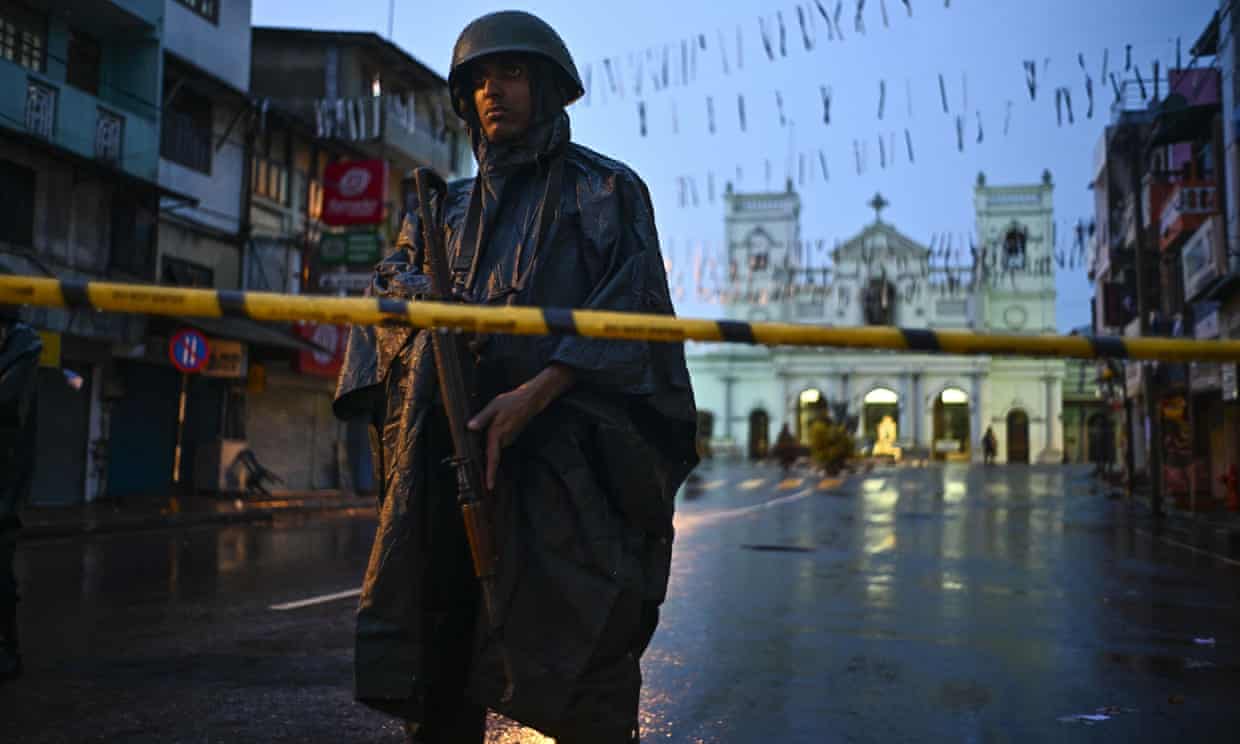
Sri Lankan president Maithripala Sirisena has said police are looking for 140 people believed to have links to Isis over the Easter Sunday attacks that killed at least 253 people.
Sirisena said some youths had been involved with the extremist group since 2013, and that top defence and police chiefs had not shared information with him about the impending attacks.
He also blamed Prime Minister Ranil Wickremesinghe’s government for weakening the intelligence system by focusing on the prosecution of military officers over alleged war crimes during a decade-long civil war with Tamil separatists.
The infighting continues amid heightened tensions. Muslim community leaders in Sri Lanka have called on Friday prayer gatherings to be held privately both because of ongoing threats from Islamic extremists and in solidarity with the country’s Catholics, whose services are still suspended due to security fears.
Sufi mosques in particular have been warned of the threat from violent fundamentalists, who regard the Islamic sect as a heretical, according to a police memo sent to Muslim organisations.
The All Ceylon Jamiyyathul Ulama, a top body of Muslim scholars, issued an advisory on Thursday evening calling on women not to wear the face-covering niqab. “In the prevailing situation our sisters should not hinder the security forces in their efforts to maintain national security by wearing the face cover (niqab),” the group said in a statement.
At least 700 refugees from a persecuted Islamic sect are in hiding after fleeing their homes in the Sri Lankan port city of Negombo as communal tensions soar in the aftermath of the deadly Easter Sunday bombings.
The bombings, which killed about 253 people – the death toll was revised down on Thursday by the health ministry – shattered the relative calm that has existed in Buddhist-majority Sri Lanka since a civil war against mostly Hindu, ethnic Tamil separatists ended 10 years ago, and have raised fears of a return to sectarian violence.
A group of around 500 Muslims are being sheltered in one city, which the Guardian is not naming. There was a significant police presence outside their location and dozens of locals were protesting, calling for the group to be removed from the area.
“These people must be pulled out from this place,” said a local provincial council member. “We don’t want them.” Signs in English and Sinhala posted outside said: “We don’t need Pakistan refugees.”
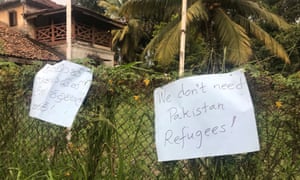
Police said the refugees would be required to stay another few days before they could be safely moved on. The group belong to the Ahmadi community, a minority sect of Islam who are persecuted in Pakistan and legally banned from enter the religion’s holy cities of Mecca and Medina.
“We’ve seen a few attacks on houses, some refugees were beaten and some stones were thrown as well so people were scared to stay in their houses,” said Ruki Fernando, a Sri Lankan activist.
“The people in Pakistan attacked us and say we’re not Muslims,” Tariq Ahmed, a 58-year-old Ahmadi who fled his home, told the Associated Press. “Then in Sri Lanka, people attack us because they say we are Muslims.”
The Ahmadi themselves have fled decades of persecution in Pakistan and elsewhere. Ahmadis believe another Islamic prophet, Ahmad, appeared in the 19th century, a view at odds with the fundamental Islamic principle that Muhammad was the final messenger sent by God.
Pakistan changed its constitution in 1974 to declare Ahmadis non-Muslims. Ten years later, the government declared it a criminal offence for Ahmadis to “pose as Muslims.”
“We are not their enemies. We are facing the same situation these people are facing,” said Qazi Moin Ahmed, 21. “We are not terrorists, but they consider us terrorists.”
Babar Baloch, a UNHCR spokesman, said the agency had received word from refugees that they “have been the targets of threats and intimidation,” and that efforts continued to make sure they were safe. Some 1,600 refugees and asylum seekers are registered with UNHCR in Sri Lanka, he said.
“UNHCR is working closely with local and national authorities who have been very supportive and helpful to ensure the security and safety of all refugees and asylum-seekers during this time of heightened anxiety and concern,” Baloch said.
Sri Lanka’s 22 million people include minority Christians, Muslims and Hindus. Until now, Christians had largely managed to avoid the worst of the island’s tensions.
Security has been increased at churches, which have been ordered to stay closed until further notice, government officials said. A senior priest told AFP: “There will be no public mass said until further notice.”

Sri Lanka’s Muslim Council said on Thursday night that Islamic community leaders had agreed that bodies of the terrorists would not be buried in an mosque burial ground.
“The Muslim community is so angry about this that they want to disown [the bombers],” said Hilmy Ahmed, a top official at the council, an umbrella organisation of Muslim civil society groups. “Their bodies will eventually be released — whatever is left of their bodies. [We] will not entertain the burial of them in the mosque.”
He said the community’s council of theologians, a body of religious scholars, had initially resisted the idea but relented and given its approval on Thursday.
In other developments on Thursday, police officials confirmed that Mohamed Yusuf Ibrahim, a prominent businessman and father of two of the bombers, had been detained in the aftermath of the attacks.
More people, including foreigners, were swept up for questioning overnight as domestic and international authorities investigated the Easter bombings. Police said an Egyptian and several Pakistanis were among those detained, although there was no immediate suggestion they had direct links to the attacks.
Most of Sunday’s victims were Sri Lankans, although authorities confirmed that at least 38 foreigners were also killed. These included British, US, Australian, Turkish, Indian, Chinese, Danish, Dutch and Portuguese nationals.
A picture has emerged of a group of nine well-educated, homegrown Islamist suicide bombers, including a woman, who carried out the attacks. However, authorities have also focused their investigations on international links to the domestic Islamist groups – National Thowheed Jamath and Jammiyathul Millathu Ibrahim – they believe carried out the attacks.
Isis offered no firm information to back up its claim of responsibility. It released a video on Tuesday that showed eight men, all but one with their faces covered, standing under a black Islamic State flag and declaring their loyalty to its leader, Abu Bakr Al-Baghdadi.
The man whose face could be seen has been identified as Mohamed Zahran, also known as Zahran Hashim, a preacher from the east of Sri Lanka known for his militant views and who officials believe was the attack’s mastermind. One of the bombers was identified as Abdul Latheef Mohamed Jameel, who studied in the UK and Australia before returning to settle in Sri Lanka.
Police said on Thursday a further 16 people were detained for questioning overnight, taking the number held since Sunday to at least 76. That number includes a Syrian national.
A police statement said one of those detained overnight was linked to a terrorist organisation but gave no other details. It said another was taken into custody after they investigated posts on the individual’s Facebook page and found what they described as hate speech.
The Guardian

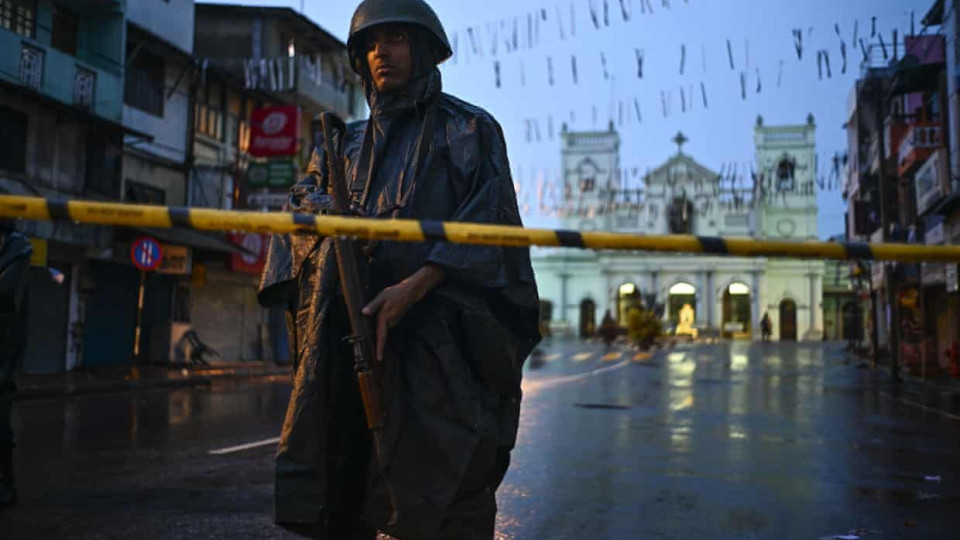
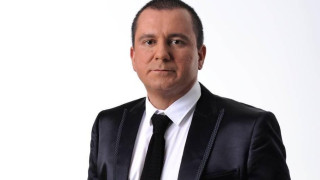
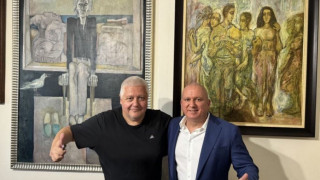
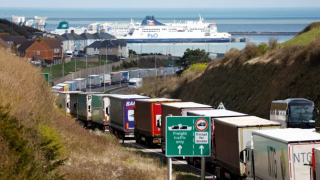

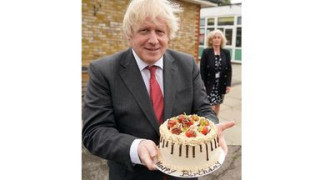


Leave a comment